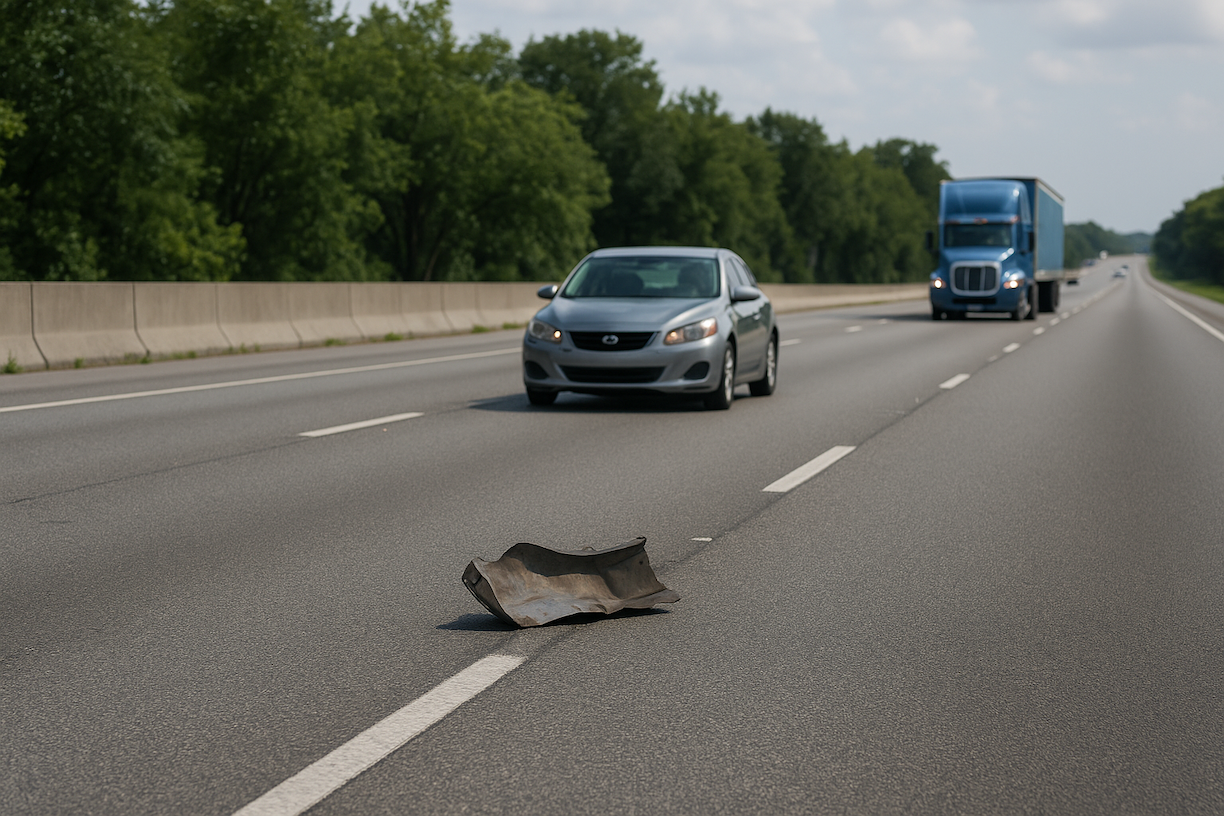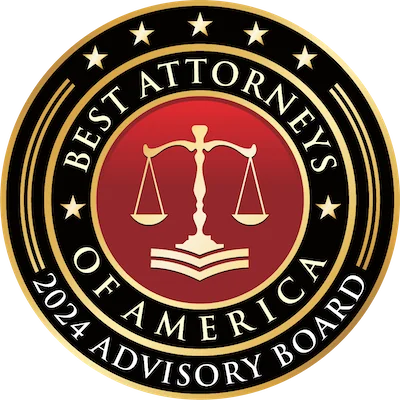Last month, I received a call from a client who experienced every driver’s nightmare. She was driving north on I-95 when a ladder fell from a contractor’s truck ahead of her. In the split second she had to react, she swerved to avoid the ladder and collided with a vehicle in the next lane. Both cars were totaled, and she suffered a concussion and whiplash. The contractor who lost the ladder never stopped.
This scenario illustrates how dangerous road debris can be, particularly at highway speeds where drivers have mere seconds to react. What many people don’t realize is that debris-related accidents are far more common than we think. According to AAA, road debris causes more than 200,000 crashes annually in the United States. The question that follows these accidents is always the same: who is liable when debris causes a crash in Florida?
Understanding liability in debris-related accidents can be complex because multiple parties might share responsibility, and sometimes the responsible party has already left the scene. As someone who has handled numerous debris accident cases throughout South Florida, I’ve learned that these crashes require immediate action and careful investigation to protect your rights.
What Counts as Road Debris?
Road debris encompasses any object that doesn’t belong on the roadway and creates a hazard for drivers. This includes unsecured items that fall from vehicles, such as furniture, tools, construction materials, or appliances. Tire treads that separate from trucks, known as “road gators,” represent one of the most common and dangerous types of debris on Florida highways.
Natural debris also poses significant risks. Tree branches that fall during storms, rocks that tumble from landscaping trucks, or construction materials left behind after road work can all cause serious accidents. Even smaller items like loose cargo straps or tarps can become deadly projectiles at highway speeds.
It’s important to distinguish between stationary debris and debris in motion. Stationary debris has already come to rest on the roadway, while debris in motion is actively falling or flying from another vehicle. This distinction matters for liability purposes because it affects what you reasonably could have avoided and who bears responsibility for the accident.
Common Types of Debris-Related Accidents
In my experience representing accident victims, debris-related crashes typically fall into three categories. The most common involves drivers swerving to avoid debris and colliding with other vehicles, guardrails, or roadside objects. These accidents often result in serious injuries because the evasive maneuver happens so quickly that drivers overcorrect or lose control.
Direct impact accidents occur when drivers can’t avoid the debris and strike it head-on. Large objects like furniture or construction equipment can cause catastrophic damage to vehicles and severe injuries to occupants. Even smaller debris can be deadly if it strikes the windshield or causes tire blowouts.
Chain-reaction crashes represent the most complex debris accidents. When one vehicle strikes or swerves to avoid debris, it can trigger a multi-car collision involving drivers who never saw the original hazard. These accidents often result in conflicting stories about what happened and require thorough investigation to establish fault.
Who Could Be Liable?
Determining liability in road debris accidents requires identifying the source of the debris and proving negligence. Other drivers bear responsibility when debris falls from their vehicles due to improperly secured loads. Florida law requires drivers to secure their cargo adequately, and failure to do so makes them liable for resulting accidents.
Commercial vehicle operators and trucking companies face heightened responsibility because they transport larger, more dangerous loads. Federal regulations govern how commercial vehicles must secure cargo, and violations of these rules can establish negligence. Trucking companies may also be liable for their drivers’ actions under respondeat superior principles.
Government entities or contractors can be responsible when debris results from road construction, tree trimming, or maintenance activities. If a contractor fails to clean up properly after completing work, or if a government agency leaves hazardous materials on the roadway, they may face liability for resulting accidents.
The most challenging cases involve unidentified third parties in hit-and-run or “phantom debris” situations. When the vehicle that dropped the debris leaves the scene, proving fault becomes extremely difficult. These cases often require uninsured motorist coverage or other creative legal approaches to secure compensation.
Challenges in Proving Fault
Debris accident cases present unique evidentiary challenges. Eyewitness testimony becomes crucial because these accidents happen quickly, and debris may scatter or be cleared away before police arrive. Dashboard cameras have become invaluable tools for proving what happened and identifying responsible parties.
Police reports help establish the basic facts, but officers often arrive after the debris has been moved or cleared. Taking photos immediately after the accident, if safely possible, can preserve crucial evidence about the debris’s size, type, and location.
When the source of debris cannot be identified, these accidents may become uninsured motorist claims. Florida’s no-fault insurance law still applies initially, meaning your Personal Injury Protection (PIP) coverage will handle immediate medical expenses regardless of fault. However, serious injuries may allow you to step outside the no-fault system and pursue additional compensation.
What You Should Do After a Debris-Related Crash
Your actions immediately following a debris accident can significantly impact your ability to recover compensation. First, call 911 and specifically report the debris to dispatchers. This ensures that road crews can remove the hazard and prevents additional accidents.
Take photos of the accident scene, your vehicle damage, the debris if still present, and any visible injuries. Write down exactly what happened while the details are fresh in your memory. Note the time, weather conditions, traffic patterns, and anything you remember about the vehicle that dropped the debris.
Try to identify the source of the debris if possible. Get license plate numbers, vehicle descriptions, and company names from commercial vehicles. Other drivers or witnesses may have seen where the debris came from, so gather their contact information as well.
Contact your insurance company promptly to report the accident, but be careful about making detailed statements until you understand your legal options. Florida Statute 316.520 requires drivers to report accidents involving injury, death, or property damage exceeding $8,000, and debris accidents often meet these thresholds.
If you’ve suffered injuries, consult with a personal injury attorney experienced in debris accident cases. These claims require quick action to preserve evidence and identify responsible parties before they disappear.
Protecting Your Rights After a Debris Accident
Debris-related accidents can be just as serious as any other type of collision, but they present unique challenges in establishing liability and securing compensation. Even when you can’t identify the vehicle that dropped the debris, you may still have options for recovery through your own insurance coverage or by pursuing claims against other potentially responsible parties.
The key is acting quickly to document everything and understanding that these accidents often involve multiple insurance policies and legal theories. What seems like an unavoidable accident may actually result from someone’s negligence in securing their load or maintaining safe road conditions.
If you’ve been injured in a debris-related accident, don’t assume you have no recourse simply because the responsible party left the scene. Contact our experienced Florida auto accident attorneys to explore all available options for securing the compensation you deserve. We understand the complexities of these cases and will fight to hold the right parties accountable for your injuries and losses.




